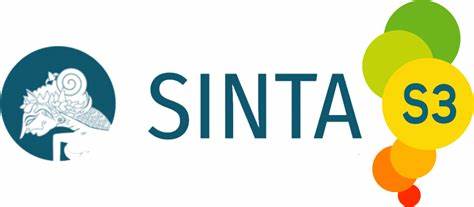USING CHATGPT TO SUPPORT EFL WRITING: STUDENT INSIGHTS AND EXPERIENCES
Abstract
The rapid growth of digital technology in the Society 5.0 era has changed many aspects of education, especially in language learning where students face challenges in writing such as grammar, idea development, and confidence. To address these issues, artificial intelligence tools like ChatGPT are increasingly used to support learning. This study explores the perceptions and experiences of seventh-semester English Education students at Universitas Muhammadiyah Tangerang in using ChatGPT for academic writing. A qualitative descriptive method was applied, with data collected through a questionnaire of 30 students and interviews with 15 students. The findings show that students generally perceive ChatGPT positively, regarding it as easy, convenient, and supportive in enhancing motivation, confidence, and efficiency. Their perceptions also reflect critical awareness of potential risks such as inaccuracy, plagiarism, and over-reliance. In terms of experience, students reported using ChatGPT for grammar correction, paraphrasing, and idea generation, which made the writing process smoother and more manageable. Overall, the study concludes that ChatGPT can be a valuable tool for EFL academic writing when used critically and ethically, offering important implications for educators in integrating AI into language learning.
References
Adiguzel, T., Kaya, M. H., & Cansu, F. K. (2023). Revolutionizing education with AI: Exploring the transformative potential of ChatGPT. Contemporary Edyilucational Technology, 15(3). https://doi.org/10.30935/cedtech/13152
Afkarin, M. Y., & Asmara, C. H. (2024). Investigating the implementation of ChatGPT in English language education: Effects on student motivation and performance levels. Journey: Journal of English Language and Pedagogy, 7(1), 57–66. https://doi.org/10.33503/journey.v7i1.865
Ahmad, S., Umirzakova, S., Mujtaba, G., Amin, M. S., & Whangbo, T. (2023). Education 5.0: Requirements, Enabling Technologies, and Future Directions. 113–120. http://arxiv.org/abs/2307.15846
Aydin Yildiz, T. (2023). The Impact of ChatGPT on Language Learners’ Motivation. Journal of Teacher Education and Lifelong Learning, 5(2), 582–597. https://doi.org/10.51535/tell.1314355
Busetto, L., Wick, W., & Gumbinger, C. (2020). How to use and assess qualitative research methods.
Chia, C. S. C., & Lee, K. (2024). Graduate Students ’ Perception and Use of ChatGPT as a Learning Tool to Develop Writing Skills. 6, 113–127.
Creswell, J. W., & Creswell, J. D. (2022). Research design: Qualitative, quantitative, and mixed methods approaches (6th ed.). SAGE Publications.
Donkoh, S., & Mensah, J. (2023). Application of triangulation in qualitative research. Journal of Applied Biotechnology & Bioengineering, 10(1), 6–9. https://doi.org/10.15406/jabb.2023.10.00319
Fukuyama, M. (2018). Society 5.0: Aiming for a New Human-Centered Society. Japan SPOTLIGHT, August, 47–50. http://www8.cao.go.jp/cstp/
Hardianti, H., Risnawati, R., & Ananta, N. (2024). Enhancing personalized learning and engagement through technology in modern education. Educia Journal, 2(1), 46–55. https://doi.org/10.71435/610413
Hidayatullah, E. (2024). Evaluating the effectiveness of ChatGPT to improve English students’ writing skills. Conference Series, 1(1), 14–19.
Hoa, V. X., & Khoa, N. H. (2024). English- majored students ’ perceptions of using ChatGPT in English writing. August, 71–78. https://doi.org/10.51386/25815946/ijsms-v7i4p109
Jarrah, A. M., Wardat, Y., & Fidalgo, P. (2023). Using ChatGPT in academic writing is (not) a form of plagiarism: What does the literature say? Online Journal of Communication and Media Technologies, 13(4). https://doi.org/10.30935/ojcmt/13572
Mun, C. (2024). EFL Learners’ English Writing Feedback and Their Perception of Using ChatGPT. STEM Journal, 25(2), 26–39. https://doi.org/10.16875/stem.2024.25.2.26
Park, H. (2024). ChatGPT-integrated English Writing : Writing Strategies and Perceptions. 85–103.
Rahman, M. K., Hossain, M. A., Ismail, N. A., Hossen, M. S., & Sultana, M. (2025). Determinants of students’ adoption of AI chatbots in higher education: The moderating role of tech readiness. Interactive Technology and Smart Education. Advance online publication. https://doi.org/10.1108/ITSE-12-2024-0312
Salam, U. (2024). The Integration of ChatGPT in English for Foreign Language Course: Elevating AI Writing Assistant Acceptance. Computers in the Schools, December. https://doi.org/10.1080/07380569.2024.2446239
Shikun, S., Grigoryan, G., Huichun, N., & Harutyunyan, H. (2024). AI chatbots: Developing English language proficiency in EFL classroom. Arab World English Journal (AWEJ) Special Issue on ChatGPT, April 2024, 292–305. https://dx.doi.org/10.24093/awej/ChatGPT.20
Song, C., & Song, Y. (2023). Enhancing academic writing skills and motivation: assessing the efficacy of ChatGPT in AI-assisted language learning for EFL students. Frontiers in Psychology, 14(December), 1–14. https://doi.org/10.3389/fpsyg.2023.1260843
Taherdoost, H., Business, H., Sdn, S., Group, C., & Lumpur, K. (2016). Sampling Methods in Research Methodology ; How to Choose a Sampling Technique for. International Journal of Academic Research in Management (IJARM), 5(2), 18–27.
Tajik, O., Golzar, J., & Noor, S. (2024). Purposive sampling: Benefits, drawbacks, and applications in qualitative research. International Journal of Education & Language Studies, 2(2), 1–8.
Teng, M. F. (2024). A Systematic Review of ChatGPT for English as a Foreign Language Writing: Opportunities, Challenges, and Recommendations. International Journal of TESOL Studies, 6(3), 36–57. https://doi.org/10.58304/ijts.20240304
Wei, Y. (2022). Toward Technology-Based Education and English as a Foreign Language Motivation: A Review of Literature. Frontiers in Psychology, 13(April). https://doi.org/10.3389/fpsyg.2022.870540
Yaraşi, Z., & Kanatlı Öztürk, F. (2022). Society 5.0 in human technology integration: Digital transformation in educational organizations. International Journal of Progressive Education, 18(1), 458–474. https://doi.org/10.29329/ijpe.2022.426.26
Zulfa, S., Dewi, R. S., Hidayat, D. N., Hamid, F., & Defianty, M. (2023). The Use of AI and Technology Tools in Developing Students’ English Academic Writing Skills. The Annual International Conference on Education, 1, 47–63.
Downloads
Published
Issue
Section
License

This work is licensed under a Creative Commons Attribution-ShareAlike 4.0 International License.
The author is responsible for acquiring the permission(s) to reproduce any copyrighted figures, tables, data, or text that are being used in the submitted paper. Authors should note that text quotations of more than 250 words from a published or copyrighted work will require grant of permission from the original publisher to reprint. The written permission letter(s) must be submitted together with the manuscript.




